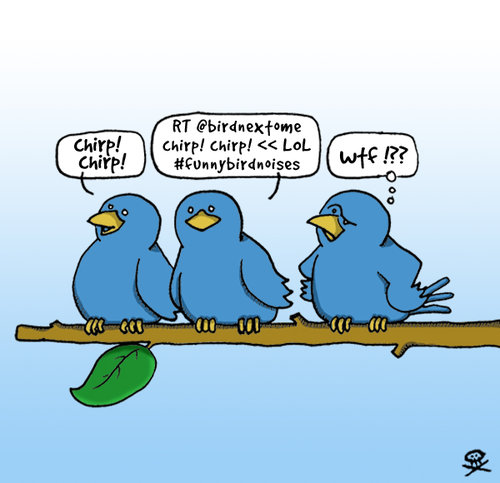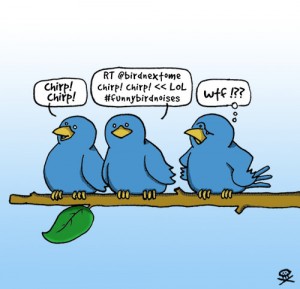This August I celebrated one year of being on Twitter. On the auspicious occasion of my Twitter-versary I decided it might be useful to reflect on the year. Did I get what I wanted to get out of the experience? Did I get other things I didn’t expect? Or did I just find myself an amazing way to waste a lot of time? Should I continue my affair with the Twitter-verse? (SPOILER ALERT – I’m obsessed with Twitter so of course the answer is an emphatic yes!)
What did I want to get out of the Twitter experience?
For some reason TCD doesn’t have much of an international reputation in Ecology and Evolution, despite a strong record in publishing papers in the area. In fact, when I started working here in January 2012 a lot of people were surprised that TCD had science departments! Clearly this needed to be fixed if we were going to attract high quality students and postdocs to our groups. A couple of my friends had been raving about Twitter for a while so I decided to give it a go. I also convinced Andrew Jackson to start actively using his account and over the course of the year we’ve got most of the ecology and evolution postgrads and staff on Twitter as well. The overall aim was a mixture of selfish self-promotion, and slightly more altruistic promotion of the School of Natural Sciences and our research.
Did I get what I wanted from Twitter?
I’ve been thinking about this a lot and surprisingly I don’t think I did (carry on reading below for some unexpected benefits which totally outweigh this “failure”). This is mainly because I had really unrealistic expectations of what Twitter was going to do. I had visions of hordes of potential students and postdocs contacting me. However, the reality is that, at present, I have not had anyone contact me via Twitter looking for PhD or postdoc funding opportunities. When we advertised a Chair in our department I don’t think anyone who applied saw the advert on Twitter. However, I do think some of these things will happen in time. It’s important to remember that building a Twitter following requires effort and takes a long time. It’s also really hit and miss – sometimes a tweet will get loads of retweets and replies but a similar tweet will be left to float into a black hole of nothingness. And sometimes no-one comments but everyone reads your tweet and remembers it. So it’s pretty impossible to gauge your impact.
In the interests of honesty, there are also a few other downsides to Twitter that I’ve outlined below.
Downsides I: The echo-chamber effect
This has been mentioned by lots of people, but essentially you follow people with similar opinions to yours, and vice versa. So you only see tweets from people with these similar opinions leading you to believe everyone agrees with you. I have a simple way to remind myself that this isn’t the case. Every now and then I’ll look at what’s trending in Dublin/Ireland/globally. Five minutes reading tweets about Harry Stiles from One Direction (“He’s a cupcake not a man-whore!”) are more than enough to remind me that not everyone in the world thinks about things like I do.
Downsides II: Negative tendencies
I’m not sure if this is a trait common to all scientists, or if it’s that Twitter breeds gloom, but there is a lot of negativity about academia on Twitter. Mostly this revolves around the difficulties of getting a permanent academic position, the problems of being a woman or a minority, issues with scarcity of funding, or general gripes about writing up your PhD thesis. All of these problems are real and frustrating, and it’s great to vent about them from time to time. However, if you’re already miserable then reading a whole load of negative comments can sometimes make you feel even worse. I think this is generally balanced by the other more positive aspects of Twitter but I do sometimes unfollow the most gloomy people! This leads me on to the unexpected benefits of Twitter.
Unexpected benefits I – Support
As I mentioned above, people often use Twitter to vent about the bad aspects of academia. The great thing is that when you do this there’s always a couple of people there to make you feel better, and like you’re not alone. Generally these people don’t know you personally, so it’s just a nice altruistic outpouring of support. On the flip side, when things go well people are also ready to congratulate you and encourage you. This is a wonderful and totally unexpected benefit of using Twitter! I’ve also had the great pleasure of meeting many of my Twitter friends in person recently. These are often people completely outside my area of research but they totally delightful human beings to hang out with (even if it’s extremely odd to talk to them rather than keeping it to 140 character messages).
Unexpected benefits II – Radically improved conference experiences
I enjoy conferences, but using Twitter has catapulted them into a whole new level of usefulness and enjoyment. Even just passively reading Twitter feeds during conferences I’m not attending is fascinating, and a great way to keep up with fields I’m interested in when I can’t attend the conference. When I’m at a conference, I find live tweeting really helpful for keeping myself alert and engaged in the talks, it’s an excellent way to keep notes and it allows you to interact with people who aren’t at the conference or to discuss talks with people at the conference even as the talk is being given. I also really enjoy meeting other Twitter-ers (is that a word?!) in person. This is particularly useful at conferences where I don’t know many people.
Unexpected benefits III – Resources
I already wrote a blog about the ways you can use Twitter to save time so I won’t repeat it here, but basically I’ve found links on Twitter to everything from newly published and relevant papers, statistical tests I need for my research, information on hot topics in academia, conferences, funding opportunities, resources for students etc. My students have also used it to get advice on their PhDs and side projects.
Unexpected benefits IV – Funny animals to ease the troubled mind.
Finally, if you’re ever down, avoid the gloom-mongers and look for people posting GIFs, videos or pictures of funny animals. There are few levels of gloom that cannot be alleviated by a video of animals using trampolines or my personal favourite, animals fitting into tiny spaces.
So in conclusion I think the benefits FAR outweigh the negatives of Twitter. If you haven’t tried it yet, have a go! If you have and I follow you, thank you, you’ve made my life a more interesting, engaging and hilarious animal-filled place.
Author
Natalie Cooper:ncooper[at]tcd.ie
@nhcooper123
Image source
www.binoyxj.com


